Pauline Hanson: Why the Queensland Senator is making serious inroads
UNLESS an economic miracle appears on the horizon, the years ahead look exceedingly fruitful for One Nation Senator Pauline Hanson.
QLD News
Don't miss out on the headlines from QLD News. Followed categories will be added to My News.
SHE was 1900km and 10 months away from the red leather of the Senate chamber. Sleeping out the back of Fred Brophy’s boxing tent, mingling with down-to-earth Aussies, “loving every minute of it”, Pauline Hanson and the Birdsville Races were a seamless match.
The reception was exhilarating, guaranteed to quicken the pulse of any down-on-her-luck politician looking for another crack at the big time. The exuberance of the “gidday Paulines”, the “good on ya Paulines’’, the “you get stuck into ’em Paulines”, and that big bear hug from the boxer as she pranced around Brophy’s ring in her (unapologetically) politically incorrect stint as a card girl, left even this woman – accustomed to two decades of celebrity – flustered.
“It’s a real country race meeting, that’s what it’s all about. Aussies coming together to enjoy the day,” she enthused in an impromptu interview with Courier-Mail photographer Peter Wallis, who had been taking snaps at the Birdsville Races in September 2015. “It’s great. I love it!”
Fourteen months later, Pauline’s love for ordinary “Aussies” is about to be reciprocated on a far grander scale than Birdsville can ever offer.
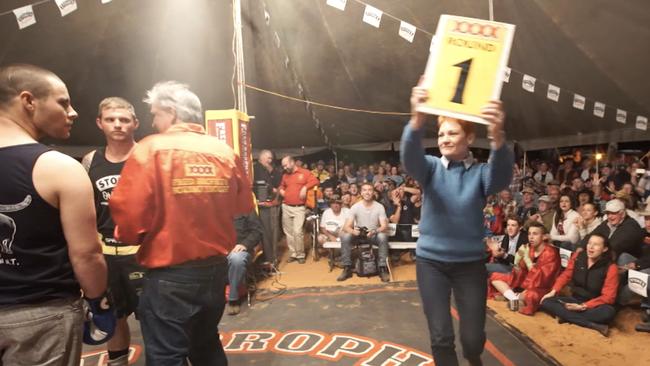
Donald Trump’s victory on November 8 marks not merely the election of the 45th US President but a pivotal departure point from the Western world’s customary commute down the Liberal Democracy Highway. To the metropolitan sophisticate, much of the developed world is now driving down dirt roads toward flag-waving, banjo-strumming “Hillbillydom”. Yet to hundreds of millions of voters, it’s simply heading back home to “common sense”. To a new world, which is dismissive of minority and gender politics, globalisation and free trade, where the favoured “ism” will not be feminism or atheism – and certainly not economic rationalism – but Patriotism with a capital “P”.
Quaffing a champagne in front of Parliament House in Canberra on the afternoon of November 9 (Australian time), as she congratulated her American political soulmate on his victory, Hanson was shamelessly thumbing her nose in front of an institution clearly as appalled as she was elated. “Why I am celebrating is that I can see that people … around the world are saying, ‘we’ve had enough of the Establishment’,” she said. “I can see in Donald Trump a lot of me and what I stand for in Australia. I think it’s great.”
If One Nation designed a theme park – a philosophical, cultural and political toon town to represent its world view – it would almost certainly resemble the Birdsville Races, with the Gympie Muster thrown in as a soundtrack. The Birdsville Races showcases an Australian identity heavily entrenched in an unabashed, unapologetic nationalism. The mainly white, tending-to-middle-aged visitors exude country-bred friendliness with strong Ocker accents. “Ow-ya-goin’ ”, “gidday” and “fair dinkum” roll easily off the tongue at the iconic September carnival, where visitors are not averse to hoisting an Australian flag over their Swagman caravans.
It’s an “Australianism” not easily articulated by those who embrace it but passionately defended by the middle-aged mechanic from Bundaberg or the retired 66-year-old “powder monkey” who once set explosions at Goonyella Mine, 160km west of Mackay, and who makes the annual trek into the Simpson Desert in a turbo-V8-powered, dust-encrusted, four-wheel-drive with its tray packed with swags, Eskies filled with XXXX Gold and Slim Dusty’s Walk A Country Mile booming through the sound system.
But while the Birdsville Races may represent the playground of this growing group of Aussie “deplorables” – as Clinton famously labelled their American cousins – the genesis of One Nation resides much closer to the coast.
While some believe it all started in the Ipswich fish and chip shop that Hanson was running when she co-founded Pauline Hanson’s One Nation Party in 1997 – with her advisers David Ettridge and David Oldfield after she was disendorsed as a federal candidate for the Liberal Party – One Nation’s ground zero lies in the magnificent agricultural hub of the beautiful Burnett region, west of Bundaberg. It is here that the first stirrings of a radical, rural, agri-based political movement sprang to life in the bleak years of the Great Depression.
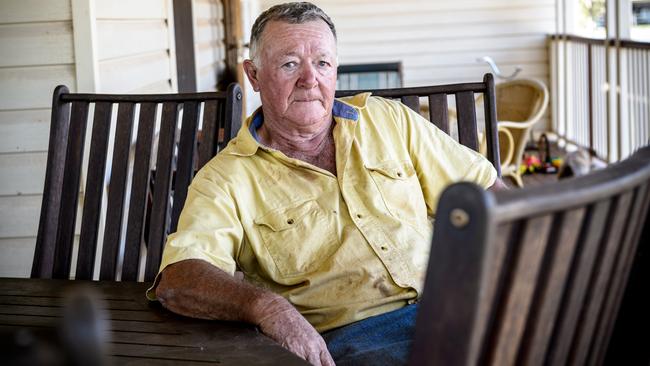
Brian Courtice, 66, is a former federal Labor MP who from July 1987 until March 1993 held the seat of Hinkler, which takes in tracts of the Wide Bay-Burnett region, 200km north of Brisbane. Since losing his seat to Nationals MP Paul Neville at the 1993 federal election and subsequently clashing with union heavyweight Bill Ludwig, Courtice has been estranged from his former party, but he can’t hide his political pedigree. He’s a Labor blueblood whose uncles began organising sugar industry labourers around Bundaberg into an organised labour movement at the start of the 20th century, which later became the AWU (Australian Workers’ Union).
Uncle Fred Courtice was an ALP member of the Queensland Legislative Council, Uncle Ben Courtice was federal minister for trade and customs in the second Ben Chifley ministry and Courtice himself, who has never lost his admiration for the core values of the more than century-old ALP, has been a political observer all his life – his antennae sharpened in two decades of political retirement.
While Hanson’s return to Canberra in the July federal election blindsided Prime Minister Malcolm Turnbull and Opposition Leader Bill Shorten, Courtice was calmly reading the political topography from the veranda of his farmhouse in the red soil country about 10 minutes outside Bundaberg. On Friday mornings, in the weeks leading up to the poll, he was telling listeners on ABC Wide Bay, where he had a weekly spot, that a One Nation-style rebellion was looming.
Four months after the federal election, on an afternoon in late October – three weeks before the US presidential poll – Courtice was taking a break from fixing a fence line, lounging around on the veranda and pondering the shifting sands of international politics. The UK’s Brexit fascinated him, as did British Prime Minister Theresa May’s apparent retreat from free trade and globalisation. But to Courtice it was Donald Trump’s powerful protectionist stance and his outlandishly politically incorrect antics that were pointing to a definitive departure from business-as-usual politics across liberal Western democracies. “I think Trump will win because people have just had a gutful of business as usual,” he said at the time.
And Courtice made another prediction on that October afternoon that in the past two weeks has ceased to be controversial and is now being echoed by political commentators across the nation. One Nation’s performance in the 2016 federal election, where the vote reached nearly 20 per cent in Hinkler, 17.15 per cent in neighbouring Flynn and 15.6 per cent in Wide Bay, was merely a sign, like a rapid outward running beach tide, he said.
“The 2017 Queensland state election will tell the real story,” he says. “That, I believe, will be the tsunami.”
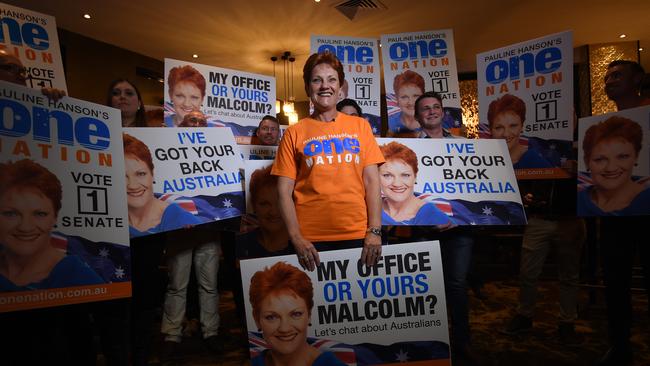
Drive into the heart of One Nation country and you’ll find extraordinary beauty, at least in a geographical sense. Ancient “Queenslander” farmhouses with peeling paint teeter above green pastures at the end of long dirt roads where warm and engaging people live lives which, observed from the airconditioned confines of a passing car, appear as a beautiful, bucolic dream.
Leave the Bruce Highway just north of Childers, about four hours from Brisbane, then drive along the narrow bitumen roads that ribbon the pastures and you’ll find yourself at Ban Ban Springs at the junction of the Burnett and Isis highways. Turn left at the servo, heads towards Goomeri and you’ll happen on a tiny settlement called Tansey, where you’ll find the physical manifestation of what Pauline Hanson has spent much of her political life pointing an accusatory finger at – trembling with indignation at all that is wrong with this “world gone mad”.
It’s a cheese factory. Or, at least, it was. Tansey cheeses were the toast of the international cheese world in the 20th century, winning several cheddar prizes at the Royal London Show and providing British troops in World War II with a popular dairy treat, flavoured by the rich lucerne grown in the alluvial soils of the Burnett.
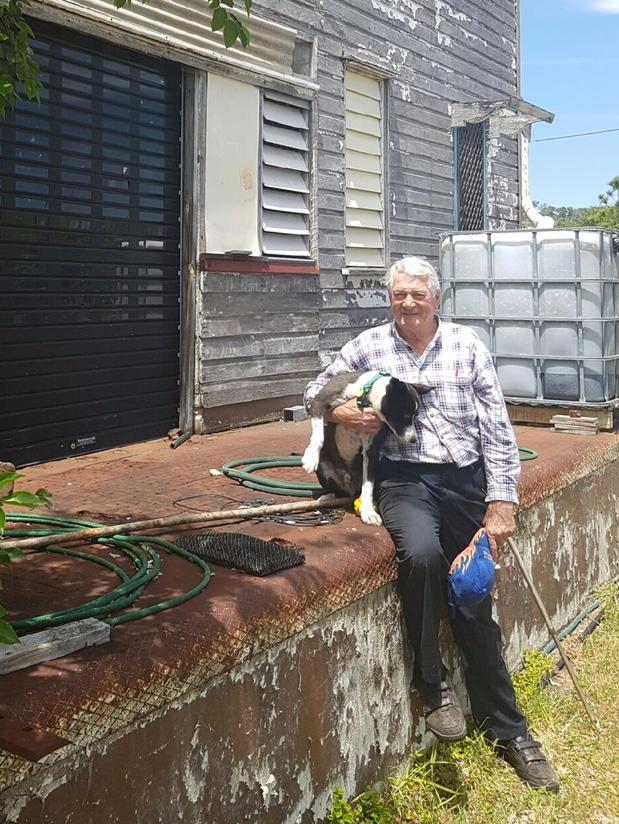
Today the cheese factory is part of the family property of amiable and articulate retirees Jeff and Bonny Carpenter, who keep it as a workshop and still toy with plans to restore it as a cottage industry project. No one has seen a Tansey cheese in more than 40 years, since production ended in the mid-’70s – even though epicurean-inclined tourists roared into town right up until the 1990s wanting to buy wholesale cheddar. The factory underwrote the local economy, which included a now-closed school that enrolled up to 60 students.
While the factory closure still causes much sorrowful head-shaking among ageing locals, it’s difficult to apportion blame for its demise. At a pinch, we could settle on British Labour prime minister Harold Wilson, who in the 1960s announced his country’s intention to enter the European Common Market, ultimately ending the cosy trade deal Australia shared with Britain.
Protectionist Sir John (“Black Jack”) McEwan, the one-time Victorian farmer and later Australia’s Country Party leader, understood immediately what England’s entry into the European Economic Community (EEC) in 1973 would mean for Tansey cheeses.
McEwan, feeling the first chill winds of global competition blowing across the country, issued a statement in 1968 saying this “trade diversification” business was all very well, but Australian farmers would be left high and dry if their primary market in England disappeared. “A good sale of iron ore to Japan does not help the dairy industry,” he said.
“Black Jack” (so nicknamed by former prime minister Bob Menzies) was on the money. It only took a couple of years after Britain’s entry into the EEC for the Tansey factory to collapse as small dairy farmers went broke or sold up. Five decades on and the dairy industry, having undergone deregulation in the ’90s, is still a poster child for One Nation – a sorry symbol of the perfectly rational economic model we live under where we pay $3.50 for half a litre of bottled water and $1 for a litre of milk while dairy producers slowly drown under financial strain.
It might make economic sense, slavishly following moral philosopher Adam Smith’s famous “invisible hand” (from his 1776 book The Wealth of Nations), which conducts the free market orchestra. But it was right here in the Burnett 80 years ago, long before Pauline Hanson was born, that the locals started questioning whether they should change the song sheet.
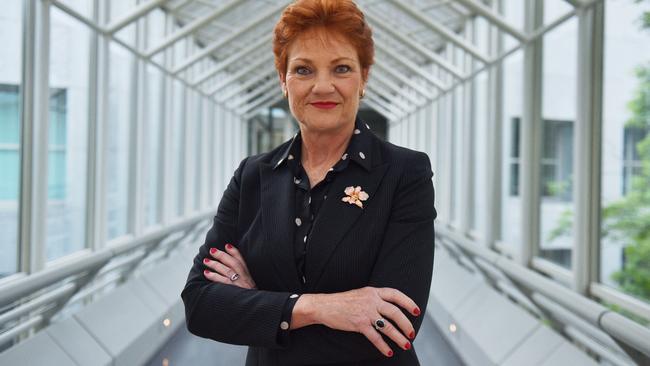
In 1921, YEARS before the Great Depression was UNDER way, British engineer Major Clifford Hugh Douglas published a book, Credit-power and democracy, providing the scaffolding for an idea that developed into the “Social Credit” movement. Social Credit is an enormously complex economic theory but at its core is the notion that capitalism and the political party system is just plain wrong, and a financial doomsday awaits those who follow it.
Social Credit incorporates a form of protectionism and believes consumers should have control of the production of goods and services, while some supporters also suggest our global financial system is in the hands of an ill-defined cohort of people who wish to dominate the world.
In Australia, Social Credit exploded in Kingaroy in the South Burnett in 1934 as the Depression hit home. Brisbane academic Dr John Harrison, who mapped out the rise of Queensland’s agricultural politics in a paper published nearly 20 years ago, says that by 1938 a Social Credit candidate in the then state seat of Nanango, based around Kingaroy, polled nearly 30 per cent of the vote.
Social Credit represented a rural fundamentalism, a quasi-religious view of the land drawing on the ideals of one of America’s founding fathers, Thomas Jefferson, who believed that everything good and worthy in the world was drawn from the farming life.
The wartime economy of the 1940s robbed the Social Credit movement of its impetus but its DNA was absorbed by the Australian League of Rights, which sprang to life in Queensland in 1949 and immediately began drawing support from Social Credit voters and traditional Country Party voters in the central and south Burnett.
Harrison says the League’s activities in the Burnett reached unparalleled heights under the Whitlam Labor government between 1973 and 1975, a period that coincided with the economic pain of the oil crisis following the Arab oil producers’ decision to impose an embargo on exports.
The Country Party (later the National Party) had an uneasy relationship with the League but the wife of Queensland’s National Party premier Sir Joh Bjelke Petersen, Florence (later Senator Flo), attended a League dinner in 1980 and remarked: “They have a lot of ideas and objectives which are similar to ours”.
Courtice remembers the League well, because he had to fight its next incarnation in the form of the Confederate Action Party, which by 1992 was able to secure more than 16 per cent of the vote in the state seat of Maryborough, which takes in parts of the Burnett. By then the “agri-right” vote was also being courted by the Citizens Electoral Council, with both parties contributing to Courtice’s loss in the 1993 federal election. “I think that in 1993, when I lost narrowly, there was something like 7000 to 9000 primary votes going to both those parties,” he says.
Five years later, One Nation swept up the agricultural right vote across the Burnett with Dorothy Pratt taking the seat of Barambah (now Nanango) in the South Burnett and John Kingston winning Maryborough, while back on the coast, Hervey Bay was won by David Dalgleish.
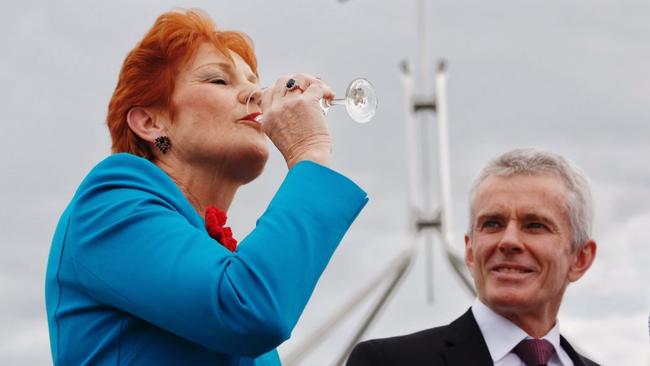
Eighteen years have passed since 11 One Nation MPs walked into the Queensland Parliament, warily eyed off by then-premier Peter Beattie, who was desperately attempting to cobble together a Labor government with support from Independents.
Beattie’s political highwire act might have to be replicated by Premier Annastacia Palaszczuk or LNP leader Tim Nicholls after the next state election, due before January 31, 2018. A Bill was passed in April to increase the number of seats in Queensland’s Legislative Assembly from 89 to 93 before the next state election, and Hanson says One Nation has received more than 100 requests from Queenslanders wanting to run for the party.
And any success that One Nation has across Queensland in 2017-18 will stem – in no small part – from the appeal the party has for people in regional areas – people battling economic cyclones, which flattened towns such as Tansey and created powerful perceptions that Queensland is divided into the wealthy southeast and the “forgotten” rest of the state.
To Courtice, issues such as Muslim immigration and same-sex marriage are key fault lines in the disconnect between Brisbane’s “elite” and people in regional Queensland. He believes many mainstream politicians underestimate the powerful contribution free-market economics and globalisation have made to the rise of One Nation, and have failed to grasp the deep historical hold One Nation’s economics have on regions like the Wide-Bay Burnett and the Outback.
“Milk factories, cheese factories, the closure of sawmills, the closure of rail lines – the people who had all those jobs are gone, and that has happened not only in the Burnett but right through regional Queensland,” he says.
On the eve of the US presidential election, Trump went to Scranton, Pennsylvania, once the “electric city” – a sobriquet it won when it introduced electric lights into a locomotive works in 1880, just 15 years after the end of the Civil War.
Now the factories are silent and Scranton has its own version of the Tansey Cheese Factory – the Scranton Lace Company. Scranton Lace employed more than 1200 workers at its peak (even Hillary Clinton’s grandfather worked there) and commanded its own little universe. It had a bowling alley, restaurant, barbershop and gym, and while Tansey gave the war effort cheese, Scranton gave it bomb parachutes and camouflage netting.
Trump blamed successive American administrations for abandoning the manufacturing and textile industries but, much like the case of the Tansey Cheese Factory, that powerful human need to point the accusatory finger and apportion blame is difficult to satisfy.
Scranton Lace management made bad investment decisions. Mechanisation rendered human input on the assembly line dispensable. Those who decried its demise flocked to Walmart aisles to buy the replacement products manufactured more cheaply overseas.
Courtice agrees there are no simple solutions to the widespread problems caused by globalisation and the collapse of tariff protection, mechanisation and the rise of the digital economy. But he’s still enough of a politician to know that the fallout from them all feeds into a powerful political narrative soon to be heard right across regional Queensland, penetrating well into urban centres.
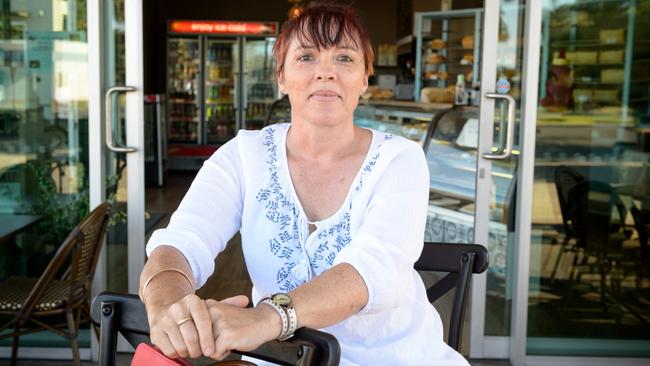
On the coast in Burnett Heads, bathed in sunshine and subtropical beauty in a district once awash with sugar money, where the nearby Maryborough-based Walkers Limited had the capacity to build huge locomotives and River Class Frigates during World War II, there’s a whiff of Scranton in the air. Queensland public servant Cath Matsen, who volunteered with One Nation’s candidate Damian Huxham in Hinkler at this year’s federal election, sits in a local shopping precinct giving voice to the more urbanised residents who voted One Nation in July.
Huxham, a former Maryborough FIFO miner, bagged 19.2 per cent of the vote in Hinkler and Matsen says many more locals like her will vote One Nation again at the next state election.
“I met Pauline Hanson at a rally and she was so genuine, so easy to talk to, so understanding of what our problems are that I felt I wanted to do something to help,” Matsen says. “People feel they are not being listened to.”
Four businesses had closed down in the past month in Burnett Heads with one closure announced on the local newspaper’s website on the day we chat.
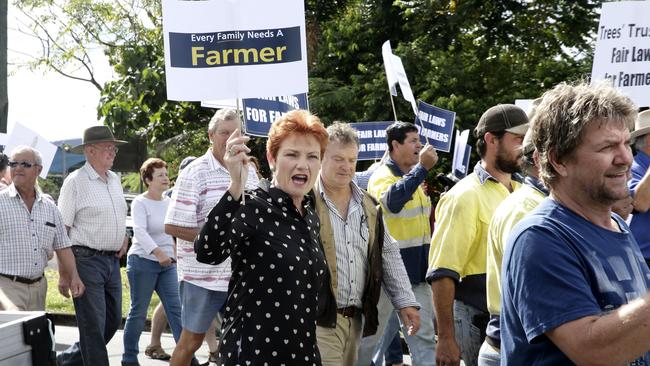
Back in Birdsville last september, Hanson is listening – and doing a lot more besides. She is buying pies and drinking beers and swapping “g’days” while rubbing shoulders with the ordinary Queenslanders who will soon propel her back into power – along with three other One Nation senators.
In Canberra, Tony Abbott is just days away from being turfed out of the prime ministerial suite by Malcolm Turnbull who, on seizing power, begins plotting a bold move to call a double dissolution election to rid the Upper House of pesky political fringe-dwellers.
The best laid plans of mice and men go oft awry, but seldom do they explode in a man’s face in such a spectacular fashion. Turnbull’s masterstroke leaves the Upper House not safely in the hands of the ruling party but festooned with MPs vigorously opposed to much of the Coalition’s world view, and specifically hostile to its support of free trade.
Hanson’s political stars have realigned amid a perfect international constellation in 2016 – but she doesn’t take her re-emergence for granted. Hanson follows the regional vote, like the one that in the US meandered through the Midwest and southern states before slipping the keys to the White House into Donald Trump’s pocket.
In her “Fed Up” tour of 2015, Hanson hopped into an Australian-built plane piloted by adviser James Ashby and went to Rockhampton, Birdsville, the Mount Isa Rodeo, anywhere the mainstream MPs steered clear of. After her two decades in the political wilderness, people welcomed Hanson back with those same old refrains uttered when she first appeared on the landscape in 1996.
“The big response I am getting from people of all ages and cultural backgrounds is, ‘you are only saying what we are thinking, but you have the guts to get up and say it’,” Hanson says.
She enthuses about the positive response from the crowd during her stint as a card girl in Brophy’s boxing tent, cheekily pondering a career change.
“Maybe I should rethink my politics and look at being a card girl with Fred Brophy,” she muses.
Ten years before he won the prime ministership in 1996, John Howard, referring to the rise of free-market economics around the world, said: “The times will suit me.”
The times now suit Hanson.
She won’t have to earn her quid in Brophy’s tent. Unless an economic miracle appears on the horizon, the years ahead look exceedingly fruitful for One Nation. ■



